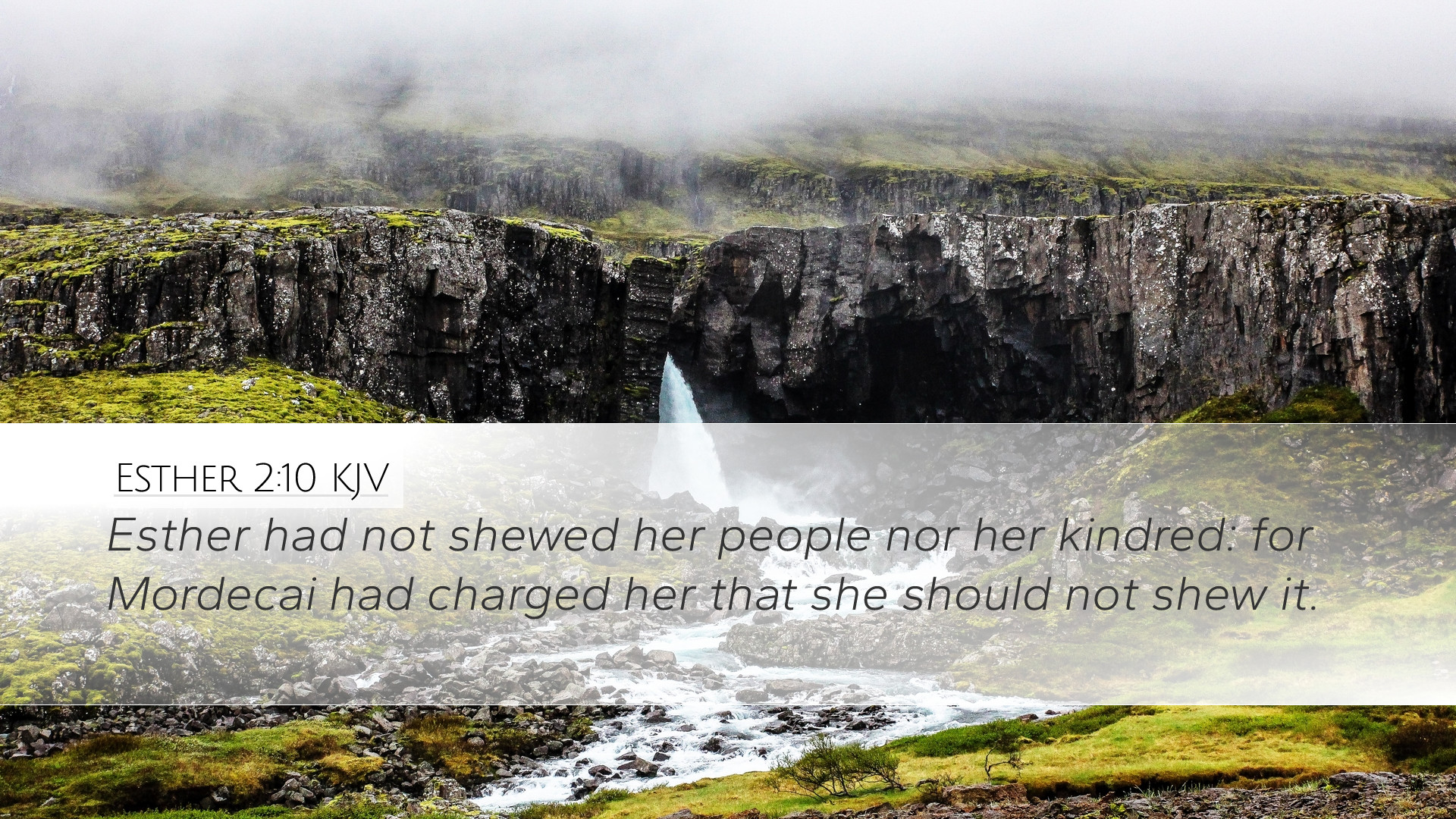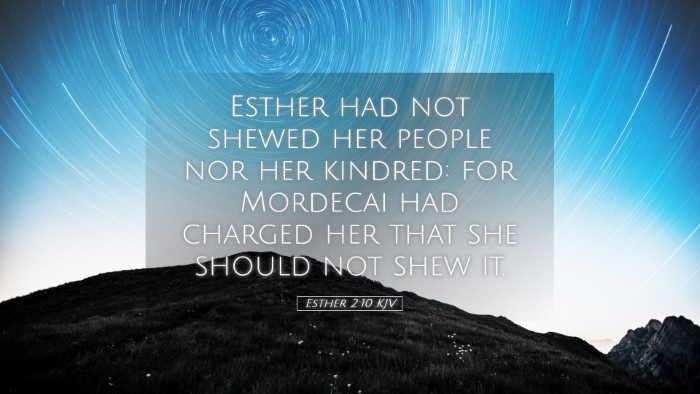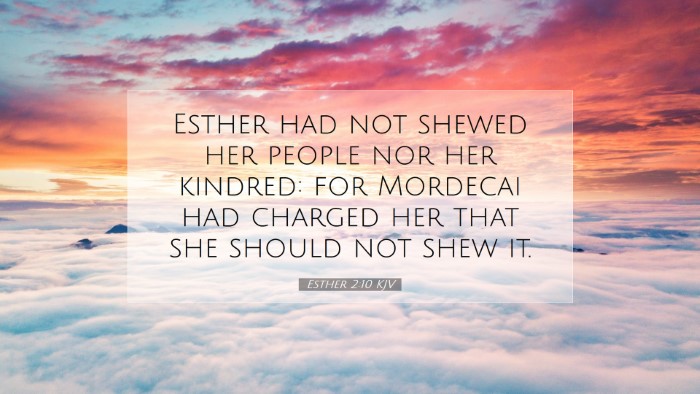Old Testament
Genesis Exodus Leviticus Numbers Deuteronomy Joshua Judges Ruth 1 Samuel 2 Samuel 1 Kings 2 Kings 1 Chronicles 2 Chronicles Ezra Nehemiah Esther Job Psalms Proverbs Ecclesiastes Song of Solomon Isaiah Jeremiah Lamentations Ezekiel Daniel Hosea Joel Amos Obadiah Jonah Micah Nahum Habakkuk Zephaniah Haggai Zechariah MalachiEsther 2:10
Esther 2:10 KJV
Esther had not shewed her people nor her kindred: for Mordecai had charged her that she should not shew it.
Esther 2:10 Bible Commentary
Commentary on Esther 2:10
Verse: “Esther had not shown her people nor her kindred: for Mordecai had charged her that she should not show it.”
Esther 2:10 presents a significant moment in the narrative of Esther, revealing themes of identity, obedience, and providence. This commentary draws upon insights from renowned public domain commentaries to illuminate the verse's meaning and implications.
Contextual Background
The Book of Esther is set during the Babylonian captivity of the Jewish people, highlighting the lives of Jews in a foreign land. Esther, a young Jewish woman, finds herself in the Persian court, ultimately chosen to be queen. This verse occurs shortly after her selection, establishing a critical situation that speaks to her identity and the possible implications of revealing her heritage.
Insight from Matthew Henry
According to Matthew Henry, Esther’s concealment of her Jewish identity serves a crucial role in the unfolding narrative. He underscores that Mordecai’s instruction to keep her lineage hidden was not just for the sake of secrecy but rather a tactical decision in a politically charged environment. Henry notes that Esther's carefulness represents wisdom and prudence, highlighting the necessity of discretion in moments of vulnerability.
Moreover, Henry comments on the wisdom that accompanies the fear of God, as Esther embodies the qualities of a faithful servant navigating a treacherous political landscape. Her understanding of the possible consequences of revealing her lineage reflects a deeper understanding of God's providential oversight.
Insights from Albert Barnes
Albert Barnes elaborates on the implications of Esther's decision to remain silent about her Jewish heritage. He emphasizes that her concealment was not merely an act of fear but rather a calculated move reflecting her awareness of the socio-political dynamics of the Persian court. Barnes indicates that Esther's silence sets the stage for her eventual role as a deliverer for her people.
Barnes also examines the cultural context, noting that in a time when Jewish identity could lead to persecution, Esther's hesitance to disclose her ancestry was an act of prudence. He connects this to the larger theme of hiddenness and revelation found throughout the Scripture, suggesting that there are moments when God requires His people to exercise caution.
Insights from Adam Clarke
Adam Clarke provides a more anthropological view, noting the significance of Esther's name, which means "star." Clarke contends that this name alludes to her future role in shinning light in her people's darkest hour. He highlights that her beauty and position could have been jeopardized had she revealed her Jewish identity prematurely. Clarke stresses the importance of divine timing in the unfolding of God's plan, suggesting that Esther was being prepared for a larger purpose.
In addition, Clarke examines the relationship between Esther and Mordecai, noting that his guidance provided her with protection and wisdom. The dynamics of their relationship echo themes of mentorship and safeguarding that are critical for understanding leadership within a faith context.
Theological Implications
This verse raises several theological concepts that deserve reflection:
- Identity and Silence: Esther’s silence invites readers to consider the implications of identity in a pluralistic society. Christians are often called to navigate their identity carefully while being true to their faith.
- Obedience to Authority: The instruction given by Mordecai to Esther demonstrates the weight of obedience in relationships. It highlights how mentorship and guidance are pivotal in moments of decision-making.
- Divine Providence: The concealment of Esther’s identity underlines a theme of providential care. God’s hand is seen orchestrating the lives of His people, reminding believers that He works through the seemingly mundane or ordinary moments of life.
Applications for Today
Esther 2:10 invites contemporary readers—pastors, scholars, and laypersons alike—to reflect on their own identities and the complexities of living out their faith in diverse environments. Key applications gleaned from this verse include:
- Wisdom in Decisions: Like Esther, believers are called to seek wisdom in navigating challenges, understanding that sometimes discretion is necessary for greater purposes.
- Role of Mentorship: Emulating Mordecai’s role, individuals should actively participate in mentoring relationships that foster growth and help others discern their paths.
- Trust in God’s Plan: The narrative champions a trust in God's timing and plan, encouraging believers to remain faithful in their unique callings, even when the path is unclear.
Conclusion
Esther 2:10 encapsulates profound themes of identity, obedience, and divine orchestration, as understood through the lenses of Matthew Henry, Albert Barnes, and Adam Clarke. As such, this verse offers a rich tapestry of insights that resonate with the challenges of contemporary faith life, encouraging believers to navigate their identities while trusting in God's greater purpose.


